人教版高二英语必修5 Unit 1 Great Scientists Grammar 过去分词作定语表语宾补课件(共35张ppt)
文档属性
| 名称 | 人教版高二英语必修5 Unit 1 Great Scientists Grammar 过去分词作定语表语宾补课件(共35张ppt) | 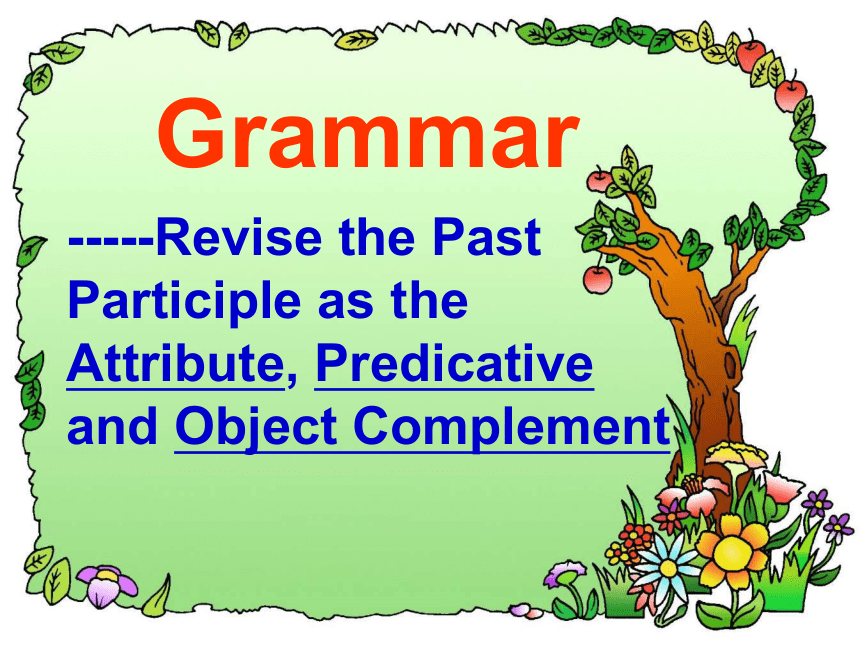 | |
| 格式 | ppt | ||
| 文件大小 | 678.0KB | ||
| 资源类型 | 教案 | ||
| 版本资源 | 人教版(新课程标准) | ||
| 科目 | 英语 | ||
| 更新时间 | 2020-09-19 19:44:18 | ||
图片预览

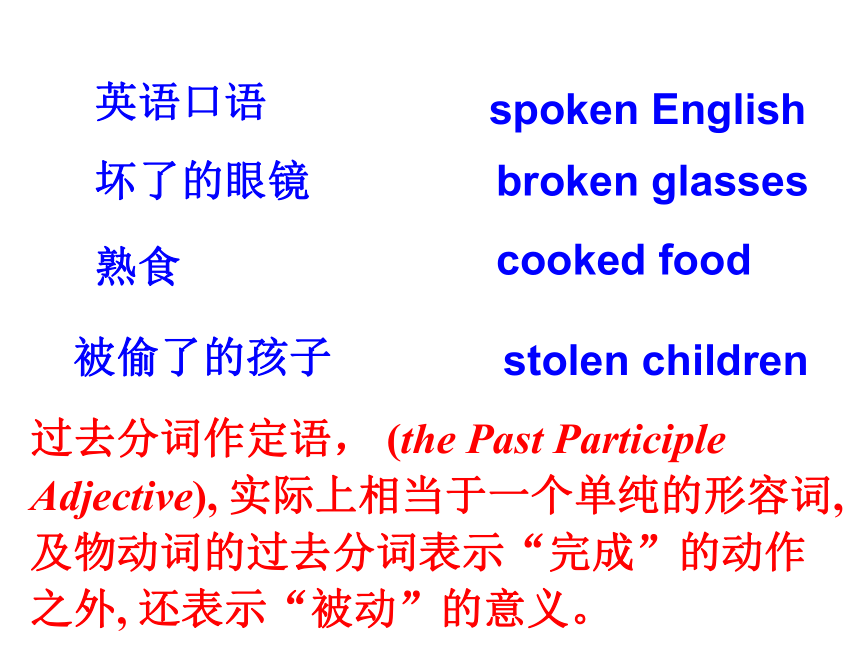

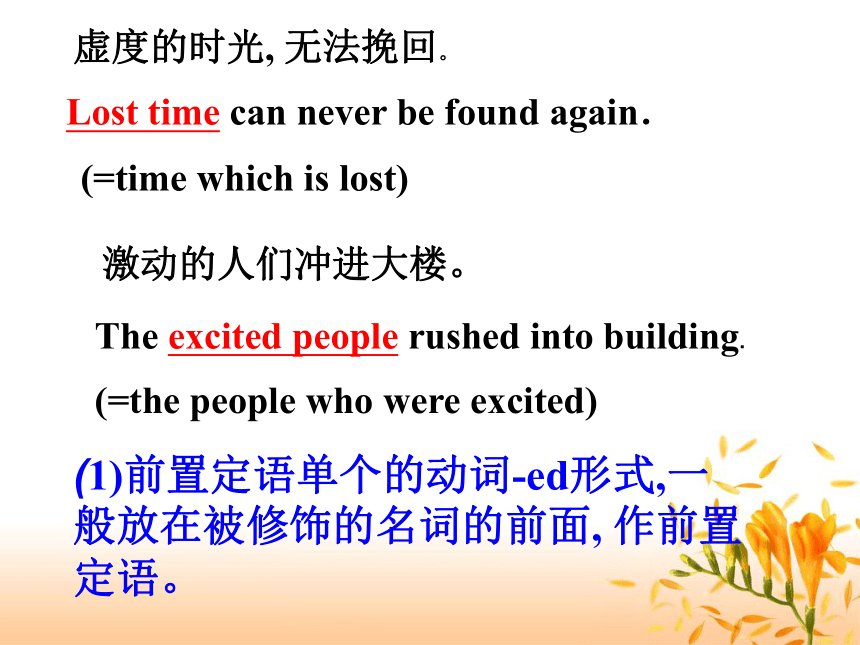
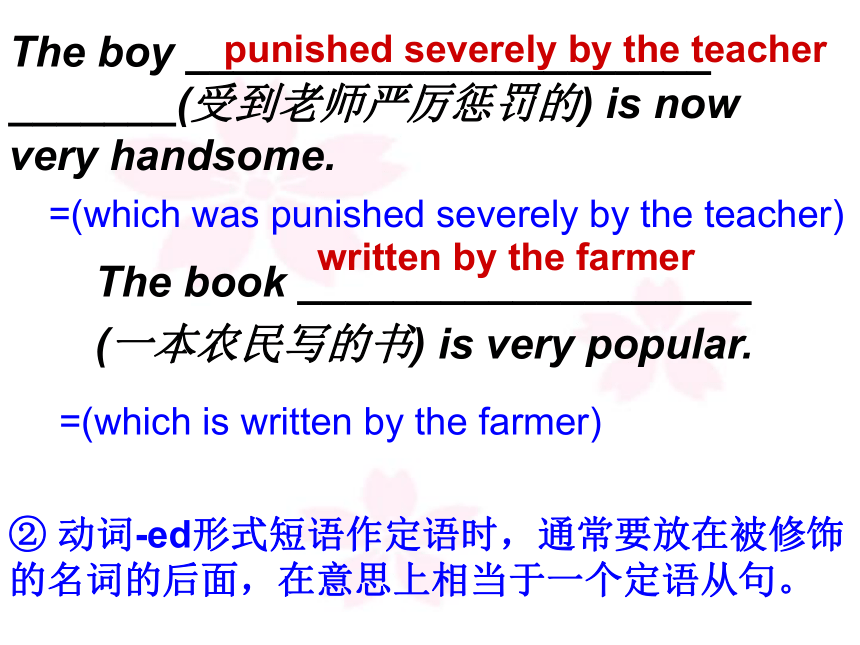
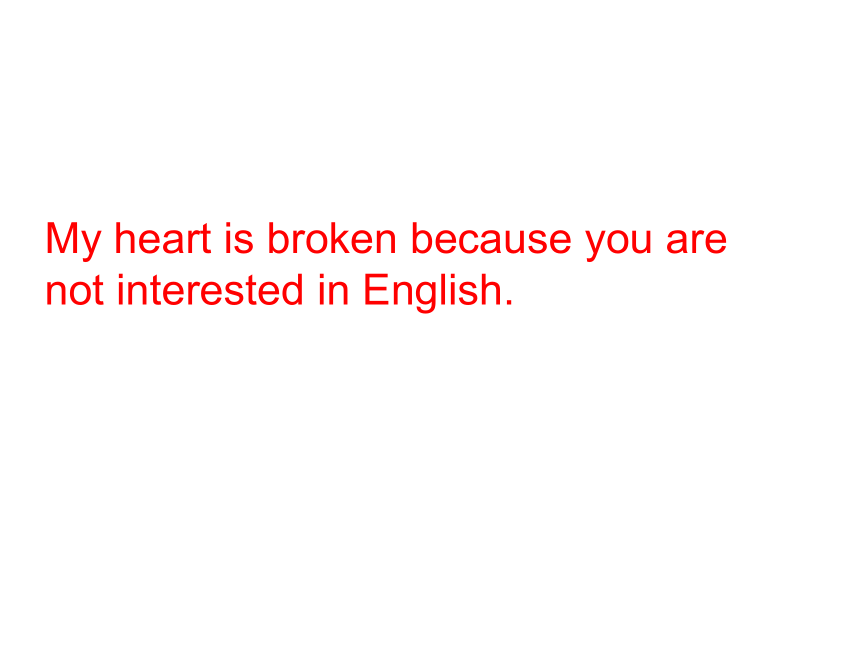
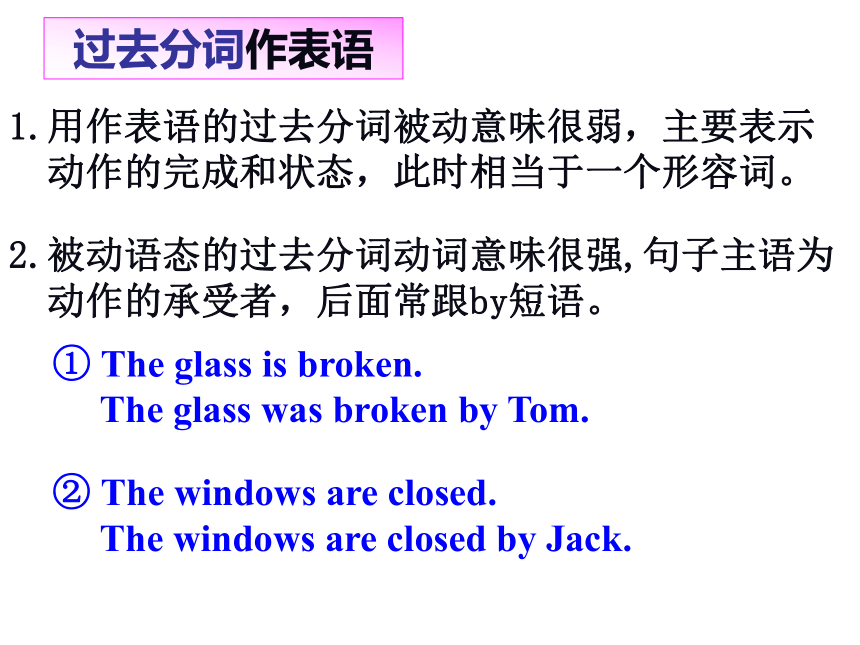
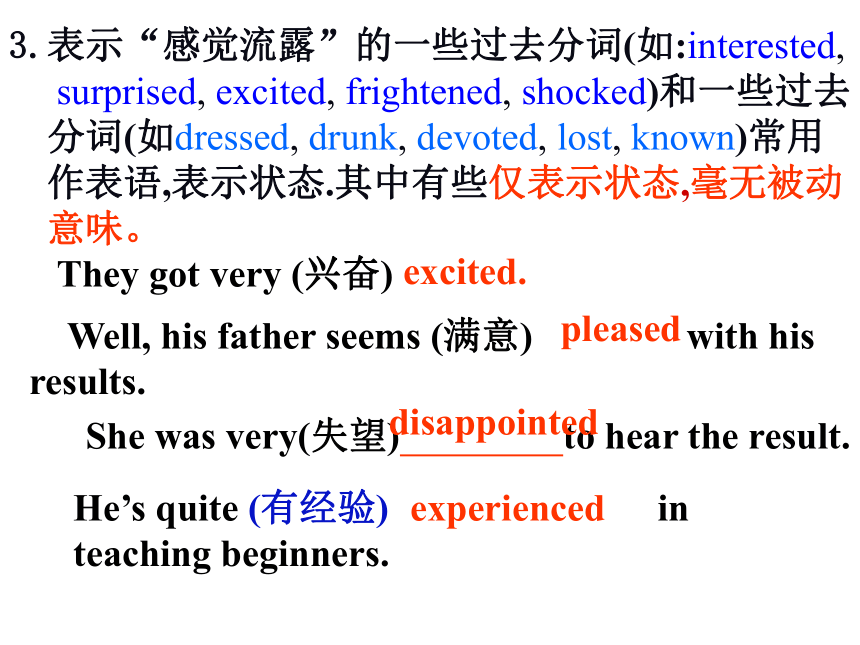
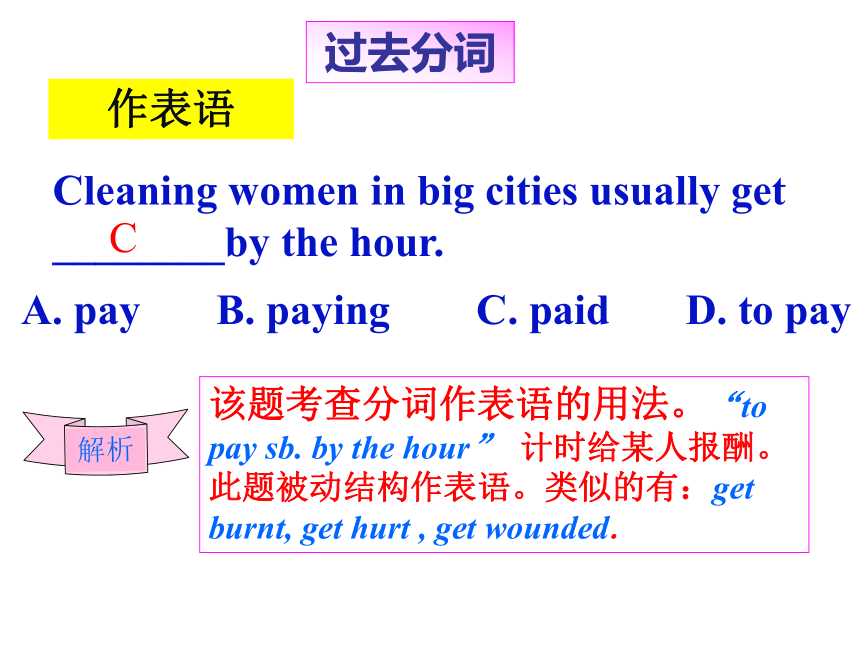
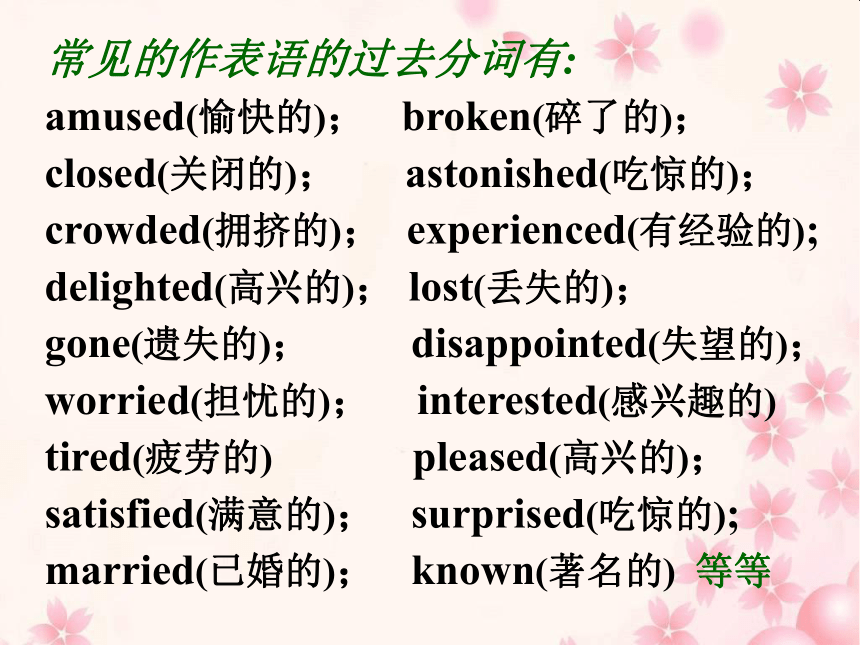
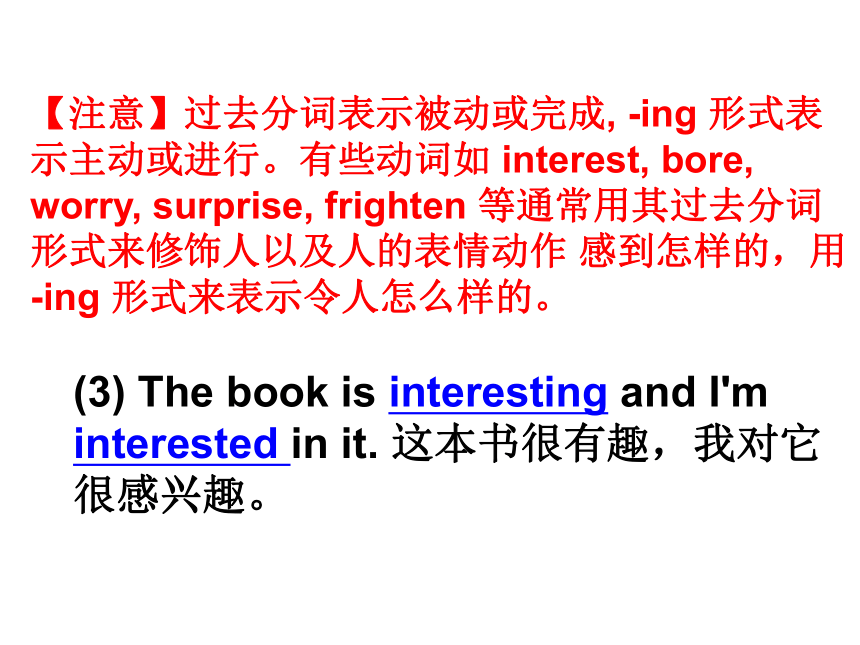
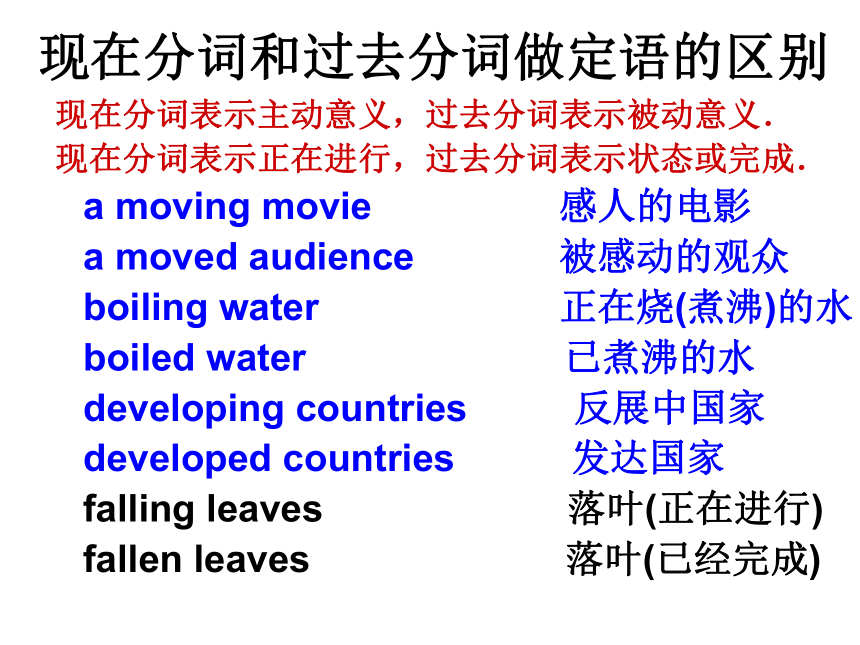
文档简介
现在分词和过去分词做定语的区别
现在分词表示主动意义,过去分词表示被动意义.
现在分词表示正在进行,过去分词表示状态或完成.
a moving movie 感人的电影
a moved audience 被感动的观众
boiling water 正在烧(煮沸)的水
boiled water 已煮沸的水
developing countries 反展中国家
developed countries 发达国家
falling leaves 落叶(正在进行)
fallen leaves 落叶(已经完成)
She found the door broken in when she came back.
她回来时发现有人破门而如入。
My grandfather had his old house rebuilt.
我爷爷找人重修了一下他的旧房子。
② 参遭遇某种意外情况。
昨天她的钱包被偷了。
③ 完成某事 (自己也可能参与)。
我把所有的拼写错误都改正了。
_______________________________________
他今年已存了1000元。
“with +宾语+过去分词”结构
“with +宾语+过去分词”结构中,过去分词用作介词 with的宾语补足语。这一结构通常在句中作时间、方式、条件、原因等状语。例如:
(3)_____________________, we all went home. 事情得到解决,我们都回家了。(表原因)
(4)?She stood in front of him,_________________________. 她站在他面前,眼睛注视着他。
(5) He stood for an instant__________________________. 他仍然举着手站了一会儿。
With many brightly colored flowers planted around the building, his house looks like a beautiful garden.
周围种了许多色彩鲜艳的花, 他的房子看上就像一座漂亮的花园。
Exercises
1. Is this the bike which you wish to have ____?
A. repaired it B. repairing
C. repair D. repaired
3. From the dates ____ on the gold coin, we decided that it was made five hundred years ago.
A. marking
B. marked
C. to be marked
D. having been marked
4. It was so large a room that a hundred people looked ____ in it.
A. losing B. lost
C. to lose D. having lost
Grammar
-----Revise the Past Participle as the Attribute, Predicative and Object Complement
英语口语
坏了的眼镜
熟食
被偷了的孩子
spoken English
stolen children
cooked food
broken glasses
过去分词作定语, (the Past Participle Adjective), 实际上相当于一个单纯的形容词, 及物动词的过去分词表示“完成”的动作之外, 还表示“被动”的意义。
不及物动词的过去分词常表示“完成”的动作,
而不表示“被动”意义。
落叶
boiled water
the risen sun
升起的太阳
开水
fallen leaves
retired teachers
退休教师
(1)前置定语单个的动词-ed形式,一般放在被修饰的名词的前面, 作前置定语。
激动的人们冲进大楼。
(=the people who were excited)
Lost time can never be found again.
虚度的时光, 无法挽回。
(=time which is lost)
The excited people rushed into building.
② 动词-ed形式短语作定语时,通常要放在被修饰
的名词的后面,在意思上相当于一个定语从句。
The boy ______________________ _______(受到老师严厉惩罚的) is now very handsome.
punished severely by the teacher
The book ___________________
(一本农民写的书) is very popular.
written by the farmer
=(which was punished severely by the teacher)
=(which is written by the farmer)
My heart is broken because you are
not interested in English.
过去分词作表语
1.用作表语的过去分词被动意味很弱,主要表示
动作的完成和状态,此时相当于一个形容词。
2.被动语态的过去分词动词意味很强,句子主语为
动作的承受者,后面常跟by短语。
① The glass is broken.
The glass was broken by Tom.
② The windows are closed.
The windows are closed by Jack.
3.表示“感觉流露”的一些过去分词(如:interested,
surprised, excited, frightened, shocked)和一些过去
分词(如dressed, drunk, devoted, lost, known)常用
作表语,表示状态.其中有些仅表示状态,毫无被动
意味。
They got very (兴奋)
She was very(失望) to hear the result.
He’s quite (有经验) in
teaching beginners.
Well, his father seems (满意) with his results.
excited.
pleased
disappointed
experienced
过去分词
作表语
C
解析
该题考查分词作表语的用法。“to pay sb. by the hour” 计时给某人报酬。此题被动结构作表语。类似的有:get burnt, get hurt , get wounded.
Cleaning women in big cities usually get ________by the hour.
A. pay B. paying C. paid D. to pay
常见的作表语的过去分词有:
amused(愉快的); broken(碎了的);closed(关闭的); astonished(吃惊的);crowded(拥挤的); experienced(有经验的); delighted(高兴的); lost(丢失的);
gone(遗失的); disappointed(失望的);worried(担忧的); interested(感兴趣的) tired(疲劳的) pleased(高兴的);satisfied(满意的); surprised(吃惊的); married(已婚的); known(著名的) 等等
【注意】过去分词表示被动或完成, -ing 形式表示主动或进行。有些动词如 interest, bore, worry, surprise, frighten 等通常用其过去分词形式来修饰人以及人的表情动作 感到怎样的,用 -ing 形式来表示令人怎么样的。
(3) The book is interesting and I'm interested in it. 这本书很有趣,我对它很感兴趣。
三、动词-ed形式作宾语补足语
能用作宾语补足语的过去分词一般都是及物动词,表示被动意义或已完成意义,有时候两者兼而有之。作宾语补足语的过去分词与宾语有逻辑上的动宾关系,即宾语是过去分词动作的承受者。
做宾语补足语的过去分词一般是及物动词,和宾语有逻辑上的主谓关系。可以带过去分词做宾语补足语的动词有:
see, hear, watch, feel, think, find , notice, suppose, consider等表示感觉和心理状态的动词。
我们发现她变了很多。
___________________________________.
We found her greatly changed
我们认为球赛输了。
___________________________
We thought the game lost.
2.make, get, have ,help, leave, hold等表示“致使”意义的动词。
什么使他们这样害怕?_________________________________.
她用双手按着脸。__________________________________________.
3.like, want, wish, order 等表示“希望,要求” 等意义的动词。
他不想让这样的问题在会上讨论。
He won’t like such questions________________________.
What made them so frightened?
discussed at the meeting
She held her hands pressed against her face.
“have+宾语+done”结构有三个含义:
She had her house repaired.
Where did you have your hair cut?
① (请人)把某事做完。过去分词所表示的
动作由他人完成。
你在哪儿理的发?
她请人把屋子修好了。
She had her wallet stolen yesterday.
他的腿断了。____________________
He had his leg broken.
过去分词所表示的动作由句中的主语所经历。
I have had all my spelling mistakes corrected.
He has had one thousand
Yuan saved this year.
The murderer was brought in, _____________________
凶手被带进来了,他的双手被绑在背后。(表方式)
(2)__________________, we can see the steam. 水一被加热,我们就会看到水蒸气。(表条件)
with his hands tied behind his back
with water heated
with her eyes fixed on his face
with his hand still raised
With the matter settled
Ⅰ.单项选择 )
2. Linda worked for the Minnesota Manufacturing and Mining Company (明尼苏达州矿业与制造公司 ), ____ as 3M.
A. knowing
B. known
C. being known
D. to be known
5. Laws that punish parents for their little children’s actions against the laws get parents ____.
A. worried B. to worry
C. worrying D. worry
6. With ____ leaves ____ in the earth every year, the soil becomes richer and richer.
A. falling; burying
B. fallen; buried
C. fallen; burying
D. falling; buried
7. She was glad to see her child well ____ care of.
A. take B. to be taken
C. taken D. taking
8. Friendship is like money easier made than ____.
A. kept B. to be kept
C. to keeping D. being kept
9. Don’t use words, expressions or phrases ____ only to people with specific knowledge.
A. being known
B. having been known
C. to be known
D. known
10. John rushed out in a hurry, ____ the door ____.
A. leaving; unlocked
B. leaving; unlocking
C. left; unlocking
D. to leave; unlocking
11. The girl ____ forward to buying a new gold watch.
A. referred to look
B. referred to looking
C. referred to looks
D. referring to looks
12. ____ with the size of the whole earth, the biggest ocean does not seem big at all.
A. Compare
B. When comparing
C. Comparing
D. When compared
Ⅱ.选择恰当的非谓语动词填空:
1. John Snow told the story about the _________ (astonish) people in Broad Street.
2. Some of the people _______ (invite) to the party couldn’t come.
3. There is a car _______ (park) outside the house.
astonished
invited
parked
4. The experience _______ (gain) will be of great value to us.
5. These seats are _______ (reserve) for you.
6. The library is ______ (close) on weekends.
7. Don’t drink the _______ (pollute) water.
8. The ________ (worry) mother looked at her________ (worry) son, looking _______(worry).
gained
reserved
closed
polluted
worried
worrying
worried
现在分词表示主动意义,过去分词表示被动意义.
现在分词表示正在进行,过去分词表示状态或完成.
a moving movie 感人的电影
a moved audience 被感动的观众
boiling water 正在烧(煮沸)的水
boiled water 已煮沸的水
developing countries 反展中国家
developed countries 发达国家
falling leaves 落叶(正在进行)
fallen leaves 落叶(已经完成)
She found the door broken in when she came back.
她回来时发现有人破门而如入。
My grandfather had his old house rebuilt.
我爷爷找人重修了一下他的旧房子。
② 参遭遇某种意外情况。
昨天她的钱包被偷了。
③ 完成某事 (自己也可能参与)。
我把所有的拼写错误都改正了。
_______________________________________
他今年已存了1000元。
“with +宾语+过去分词”结构
“with +宾语+过去分词”结构中,过去分词用作介词 with的宾语补足语。这一结构通常在句中作时间、方式、条件、原因等状语。例如:
(3)_____________________, we all went home. 事情得到解决,我们都回家了。(表原因)
(4)?She stood in front of him,_________________________. 她站在他面前,眼睛注视着他。
(5) He stood for an instant__________________________. 他仍然举着手站了一会儿。
With many brightly colored flowers planted around the building, his house looks like a beautiful garden.
周围种了许多色彩鲜艳的花, 他的房子看上就像一座漂亮的花园。
Exercises
1. Is this the bike which you wish to have ____?
A. repaired it B. repairing
C. repair D. repaired
3. From the dates ____ on the gold coin, we decided that it was made five hundred years ago.
A. marking
B. marked
C. to be marked
D. having been marked
4. It was so large a room that a hundred people looked ____ in it.
A. losing B. lost
C. to lose D. having lost
Grammar
-----Revise the Past Participle as the Attribute, Predicative and Object Complement
英语口语
坏了的眼镜
熟食
被偷了的孩子
spoken English
stolen children
cooked food
broken glasses
过去分词作定语, (the Past Participle Adjective), 实际上相当于一个单纯的形容词, 及物动词的过去分词表示“完成”的动作之外, 还表示“被动”的意义。
不及物动词的过去分词常表示“完成”的动作,
而不表示“被动”意义。
落叶
boiled water
the risen sun
升起的太阳
开水
fallen leaves
retired teachers
退休教师
(1)前置定语单个的动词-ed形式,一般放在被修饰的名词的前面, 作前置定语。
激动的人们冲进大楼。
(=the people who were excited)
Lost time can never be found again.
虚度的时光, 无法挽回。
(=time which is lost)
The excited people rushed into building.
② 动词-ed形式短语作定语时,通常要放在被修饰
的名词的后面,在意思上相当于一个定语从句。
The boy ______________________ _______(受到老师严厉惩罚的) is now very handsome.
punished severely by the teacher
The book ___________________
(一本农民写的书) is very popular.
written by the farmer
=(which was punished severely by the teacher)
=(which is written by the farmer)
My heart is broken because you are
not interested in English.
过去分词作表语
1.用作表语的过去分词被动意味很弱,主要表示
动作的完成和状态,此时相当于一个形容词。
2.被动语态的过去分词动词意味很强,句子主语为
动作的承受者,后面常跟by短语。
① The glass is broken.
The glass was broken by Tom.
② The windows are closed.
The windows are closed by Jack.
3.表示“感觉流露”的一些过去分词(如:interested,
surprised, excited, frightened, shocked)和一些过去
分词(如dressed, drunk, devoted, lost, known)常用
作表语,表示状态.其中有些仅表示状态,毫无被动
意味。
They got very (兴奋)
She was very(失望) to hear the result.
He’s quite (有经验) in
teaching beginners.
Well, his father seems (满意) with his results.
excited.
pleased
disappointed
experienced
过去分词
作表语
C
解析
该题考查分词作表语的用法。“to pay sb. by the hour” 计时给某人报酬。此题被动结构作表语。类似的有:get burnt, get hurt , get wounded.
Cleaning women in big cities usually get ________by the hour.
A. pay B. paying C. paid D. to pay
常见的作表语的过去分词有:
amused(愉快的); broken(碎了的);closed(关闭的); astonished(吃惊的);crowded(拥挤的); experienced(有经验的); delighted(高兴的); lost(丢失的);
gone(遗失的); disappointed(失望的);worried(担忧的); interested(感兴趣的) tired(疲劳的) pleased(高兴的);satisfied(满意的); surprised(吃惊的); married(已婚的); known(著名的) 等等
【注意】过去分词表示被动或完成, -ing 形式表示主动或进行。有些动词如 interest, bore, worry, surprise, frighten 等通常用其过去分词形式来修饰人以及人的表情动作 感到怎样的,用 -ing 形式来表示令人怎么样的。
(3) The book is interesting and I'm interested in it. 这本书很有趣,我对它很感兴趣。
三、动词-ed形式作宾语补足语
能用作宾语补足语的过去分词一般都是及物动词,表示被动意义或已完成意义,有时候两者兼而有之。作宾语补足语的过去分词与宾语有逻辑上的动宾关系,即宾语是过去分词动作的承受者。
做宾语补足语的过去分词一般是及物动词,和宾语有逻辑上的主谓关系。可以带过去分词做宾语补足语的动词有:
see, hear, watch, feel, think, find , notice, suppose, consider等表示感觉和心理状态的动词。
我们发现她变了很多。
___________________________________.
We found her greatly changed
我们认为球赛输了。
___________________________
We thought the game lost.
2.make, get, have ,help, leave, hold等表示“致使”意义的动词。
什么使他们这样害怕?_________________________________.
她用双手按着脸。__________________________________________.
3.like, want, wish, order 等表示“希望,要求” 等意义的动词。
他不想让这样的问题在会上讨论。
He won’t like such questions________________________.
What made them so frightened?
discussed at the meeting
She held her hands pressed against her face.
“have+宾语+done”结构有三个含义:
She had her house repaired.
Where did you have your hair cut?
① (请人)把某事做完。过去分词所表示的
动作由他人完成。
你在哪儿理的发?
她请人把屋子修好了。
She had her wallet stolen yesterday.
他的腿断了。____________________
He had his leg broken.
过去分词所表示的动作由句中的主语所经历。
I have had all my spelling mistakes corrected.
He has had one thousand
Yuan saved this year.
The murderer was brought in, _____________________
凶手被带进来了,他的双手被绑在背后。(表方式)
(2)__________________, we can see the steam. 水一被加热,我们就会看到水蒸气。(表条件)
with his hands tied behind his back
with water heated
with her eyes fixed on his face
with his hand still raised
With the matter settled
Ⅰ.单项选择 )
2. Linda worked for the Minnesota Manufacturing and Mining Company (明尼苏达州矿业与制造公司 ), ____ as 3M.
A. knowing
B. known
C. being known
D. to be known
5. Laws that punish parents for their little children’s actions against the laws get parents ____.
A. worried B. to worry
C. worrying D. worry
6. With ____ leaves ____ in the earth every year, the soil becomes richer and richer.
A. falling; burying
B. fallen; buried
C. fallen; burying
D. falling; buried
7. She was glad to see her child well ____ care of.
A. take B. to be taken
C. taken D. taking
8. Friendship is like money easier made than ____.
A. kept B. to be kept
C. to keeping D. being kept
9. Don’t use words, expressions or phrases ____ only to people with specific knowledge.
A. being known
B. having been known
C. to be known
D. known
10. John rushed out in a hurry, ____ the door ____.
A. leaving; unlocked
B. leaving; unlocking
C. left; unlocking
D. to leave; unlocking
11. The girl ____ forward to buying a new gold watch.
A. referred to look
B. referred to looking
C. referred to looks
D. referring to looks
12. ____ with the size of the whole earth, the biggest ocean does not seem big at all.
A. Compare
B. When comparing
C. Comparing
D. When compared
Ⅱ.选择恰当的非谓语动词填空:
1. John Snow told the story about the _________ (astonish) people in Broad Street.
2. Some of the people _______ (invite) to the party couldn’t come.
3. There is a car _______ (park) outside the house.
astonished
invited
parked
4. The experience _______ (gain) will be of great value to us.
5. These seats are _______ (reserve) for you.
6. The library is ______ (close) on weekends.
7. Don’t drink the _______ (pollute) water.
8. The ________ (worry) mother looked at her________ (worry) son, looking _______(worry).
gained
reserved
closed
polluted
worried
worrying
worried
